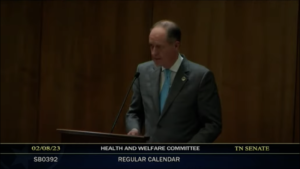As Senate Majority Leader, Senator Johnson sponsors numerous pieces of legislation every year relative to how Tennessee Government functions, including the only bill Constitutionally required to be passed every year – the budget. You can find every bill he sponsored this year by following this link. Below is additional information on some of the most consequential pieces of legislation he passed this year.
Senate Bill 1
Senate Bill 1 prohibits doctors and healthcare facilities from providing puberty blockers, cross-sex hormones, and gender transition surgeries for minors presenting with gender dysphoria.
The bill establishes a private right of action for affected children and their parents to sue violators, grants authority to the Attorney General for enforcement, and does not restrict mental health treatment for minors or medical decisions for adults.
Senate Bill 3
Senate Bill 3 prohibits sexually explicit, adult oriented entertainment from being performed in front of minors.
Senate Bill 11
In 2021, Leader Johnson led the charge to call a special session where Tennessee passed one of the first and most comprehensive bills in the Nation to push back against President Biden’s unconstitutional Covid-19 vaccine mandates. Enshrined in Title 14 of the Tennessee Code, these protection made sure that no person in Tennessee could be compelled to show proof of Covid-19 vaccination status for any reason.
Senate Bill 11 made these protections permanent in Tennessee law.
Senate Bill 213
Senate Bill 213 increases penalties for how Tennessee handles crimes involving strangulation. The bill establishes a mandatory minimum sentence of 30 days for strangulation offenses, allows prosecution as attempted murder for severe cases where the victim loses consciousness, increases penalties for aggravated strangulation if the victim is pregnant, and requires defendants charged with assault involving strangulation to post bail rather than being released on their own personal recognizance.
Senate Bill 270
Senate Bill 270 makes a variety of changes to Tennessee adoption law to provide further support for expectant mothers and streamline the adoption process. It extends the availability of services through the entire pregnancy and for 90-days post-birth. it provides virtual surrender hearings to avoid mandatory in-person court attendance. It allows earlier adoption finalization and permits foster parents a 6-month respite without losing their foster home status.
Senate Bill 273
Senate Bill 273, the Transportation Modernization Act, is a major step forward in addressing Tennessee’s demand for infrastructure projects without raising taxes or issuing road debt. To achieve this, TDOT may form partnerships with private entities to invest in projects that create new lanes and options for Tennesseans in highly congested areas. This will also allow new project methods to be utilized to speed up production and lower costs. The electric vehicle registration will be increased to bring parity to those with conventional vehicles.
Senate Bill 275
Senate Bill 275 makes various changes to Tennessee tax code to ensure we continue to lead the nation in being one of the least taxed states for individuals and businesses. This includes multiple changes to the business tax and franchise and excise tax to cut taxes and promote the growth for small businesses. It also includes a three-month food sales tax holiday in August, September, and October of 2023.
Senate Bill 281
Senate Bill 281 increases the minimum base salary for teachers to $50,000 by school year 2026-2027. These base salaries will see steady increase each year until $50,000 is met.
This bill also ends the burden of professional labor organization’s dues deductions on local school districts. This will ensure no Tennessee taxpayer resources are being used for political activities.
Senate Bill 648
This bill addresses the misuse of tax revenues generated by the downtown district in Nashville, originally designed to help fund the debt service and maintenance of the Nashville Convention Center but that had been diverted to the general fund by Metro. It clarifies that excess tax revenues should only be used for debt service, capital expenses, operating expenses, cleanliness, safety, maintenance of the qualified facility, and funding cash reserves. Additionally, the bill adds non-voting members from the state comptroller, state treasurer, and secretary of state to the board overseeing the funds.
Senate Bill 650
Senate Bill 650 is an important bill that prioritizes employee protection by ensuring that labor recognition rights are determined through secret ballot elections rather than the coercive method known as “card check.” The bill requires the Department of Economic and Community Development to enter into accountability agreements with any economic development grant recipient, allowing the state to clawback grant money if employers fail to uphold the right of employees to freely choose, or not to choose, union representation.
Senate Bill 955
Senate Bill 955 was brought to Leader Johnson by the State Treasurer and ensures that the state will only consider traditional financial metrics when making investment decisions, and prohibit the Treasurer from using ESG scores or any related environmental, social, and governance factors. When investing, the state should only prioritize financial returns and therefore, the best interests of the taxpayers rather than engaging in virtue-signaling like other states have started to do.









